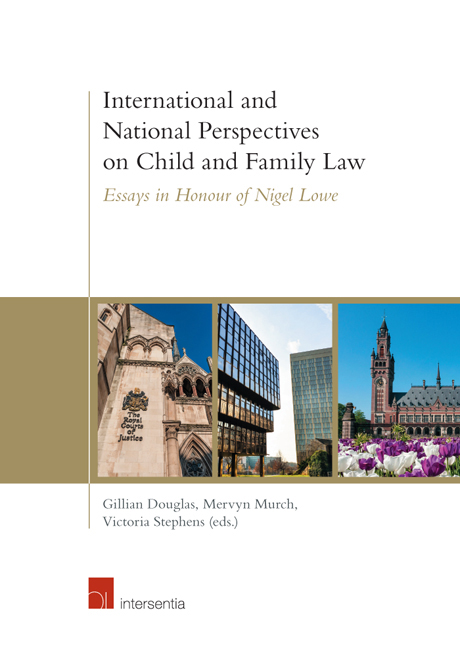Book contents
- Frontmatter
- Foreword
- Acknowledgements
- Contents
- List of Cases
- List of Contributors
- Introduction: Nigel Vaughan Lowe: An Appreciation
- Part I Family and Child Law in England and Wales
- Part II International Family Law
- Judging Parental Child Abduction: What Does it Mean to Adopt a Children's Rights-Based Approach?
- Judicial Activism: A 20-Year Evolution
- Globalisation of Adjudication in International Family Law: Serving International Families by Producing International Solutions
- Creating International Families: Private International Law and the Industry of Parenthood
- Issues in International Divorce Cases
- Non-Judicial Divorce in France: Progress or a Mess?
- The Istanbul Convention: Is Domestic Abuse Violence Against Women?
- Nationality and Migration Status in International Children's Law
- The Development of Child Protection Across International Borders for Children at Risk of Harm
- Nigel Lowe and International Family Law: An Immense Contribution
- The Spanish Constitutional Court and Protracted Child Abduction Proceedings: Time is of the Essence
- Non-Recognition of Child Marriages: Sacrificing the Global for the Local in the Aft ermath of the 2015 ‘Refugee Crisis’
- Juvenile Justice in Bulgaria: Reforms and Resistance
- Overriding Mandatory Provisions in EU Family Law Regulations
- Part III The Future for Family and Child Law
Creating International Families: Private International Law and the Industry of Parenthood
from Part II - International Family Law
Published online by Cambridge University Press: 12 October 2018
- Frontmatter
- Foreword
- Acknowledgements
- Contents
- List of Cases
- List of Contributors
- Introduction: Nigel Vaughan Lowe: An Appreciation
- Part I Family and Child Law in England and Wales
- Part II International Family Law
- Judging Parental Child Abduction: What Does it Mean to Adopt a Children's Rights-Based Approach?
- Judicial Activism: A 20-Year Evolution
- Globalisation of Adjudication in International Family Law: Serving International Families by Producing International Solutions
- Creating International Families: Private International Law and the Industry of Parenthood
- Issues in International Divorce Cases
- Non-Judicial Divorce in France: Progress or a Mess?
- The Istanbul Convention: Is Domestic Abuse Violence Against Women?
- Nationality and Migration Status in International Children's Law
- The Development of Child Protection Across International Borders for Children at Risk of Harm
- Nigel Lowe and International Family Law: An Immense Contribution
- The Spanish Constitutional Court and Protracted Child Abduction Proceedings: Time is of the Essence
- Non-Recognition of Child Marriages: Sacrificing the Global for the Local in the Aft ermath of the 2015 ‘Refugee Crisis’
- Juvenile Justice in Bulgaria: Reforms and Resistance
- Overriding Mandatory Provisions in EU Family Law Regulations
- Part III The Future for Family and Child Law
Summary
When discussing international child law, few authors are more eminent than Nigel Lowe. His exceptional writing on the international movement of children, including his work with the Permanent Bureau of the Hague Conference on Private International Law, the European Union and the Council of Europe, establishes him at the top of any reading list on the topic. In particular, his writing on parental child abduction, and its international regulation, has provided a benchmark for scholars that follow. In honour of his work on this important issue, this chapter will consider how the Hague Conference can continue its work in the field of international family law, focusing in particular on the confluence and congruence between regulation of intercountry adoption and international surrogacy.
THE CHANGING GLOBAL PICTURE
In the late 1980s, the international community was struggling to deal with the implications of intercountry adoption. A demand for adopted children in the West led to a ‘mass exportation’ of children from developing nations, accompanied by a thriving and lucrative industry for agencies and intermediaries. In response to this phenomenon, and the problems associated with it, the 1993 Hague Convention on Protection of Children and Co-operation in Respect of Intercountry Adoption was draft ed. The aim of the Convention was not to harmonise, but to regulate, thus establishing a system of co-operation to prevent the abduction, sale of, or traffic in children under the cover of adoption. Unlike earlier conventions pertaining to children draft ed by the Hague Conference, the 1993 Convention had the explicit aim of protecting the fundamental rights of children. For example, while the 1980 Convention on the Civil Aspects of International Child Abduction noted in its preamble that ‘the interests of children are of paramount importance in matters relating to their custody’, the objectives of the Convention were to ‘secure the prompt return of children’ and ‘ensure … rights of custody and access’. Though the provisions may have had the intended effect of ultimately promoting the interests of the child, the focus of the convention was on civil regulation, rather than fundamental rights. The 1993 Convention, on the other hand, instead of simply establishing common provisions on jurisdiction, applicable law and recognition of orders, went further to establish safeguards to ensure that intercountry adoption takes place in the best interests of the child.
- Type
- Chapter
- Information
- International and National Perspectives on Child and Family LawEssays in Honour of Nigel Lowe, pp. 167 - 178Publisher: IntersentiaPrint publication year: 2018



